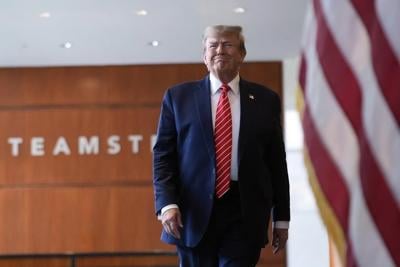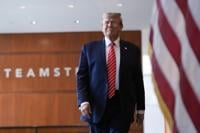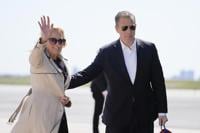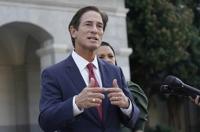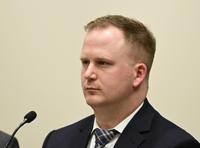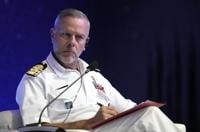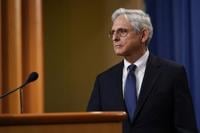NASHUA, N.H. (AP) — When he left the White House, Donald Trump was a pariah.
After years of bending Washington to his will with a single tweet, Trump was diminished. He was a one-term president rejected by voters and then shunned by large swaths of his party after his refusal to accept his defeat culminated in an insurrection at the U.S. Capitol.
But three years later, Trump is on the cusp of a stunning turnaround, with the 2024 Republican nomination closing in fast. Already, he is the first nonincumbent Republican to win the party's contests in both Iowa and New Hampshire, and his standing could improve further this week with a win in Nevada’s Republican caucuses, which his last remaining rival has chosen to skip.
And he did this all while facing 91 felonies and a civil fraud case that threatens his control of much of his business empire, among other legal troubles.
The story of how Trump became his party's likely standard-bearer for a third straight presidential election is a reminder there was an opening, however brief, when the GOP could have moved beyond him. It shows how little has been learned from 2016 as his critics again failed to coalesce around an alternative. And it demonstrates how Trump turned his unprecedented legal issues into a winning strategy.
“I think everybody got in the race thinking the Trump fever would break," said longtime Republican strategist Chip Saltsman, who chaired former Vice President Mike Pence's 2024 campaign. “And it didn’t break. It got hotter.”
A DERAILMENT
Trump campaign aides say their first sign of momentum was a trip to East Palestine, Ohio, in February 2023.
Following a lackluster announcement and slow campaign start, Trump received a rousing welcome from residents demanding answers after a train carrying toxic chemicals derailed, prompting evacuations and fears of air and water contamination.
With Democratic President Joe Biden deciding against a visit, Trump was briefed by local officials, blasted the federal response as a “betrayal" and stopped by a McDonald’s.
Trump was again casting himself as the outsider fighting big business and Washington. “It kind of reminded people what it was they liked about Trump to begin with,” said senior campaign adviser Chris LaCivita.
THE CHARGES ROLL IN
Ralph Reed, the head of the influential Faith & Freedom Coalition, was at Trump's Mar-a-Lago club in Florida last spring for a charity breakfast when news of the first indictment broke.
“You could feel the ground shift immediately,” Reed said.
But instead of calls for Trump to suspend his campaign, the response from Republicans was one of indignation. For many, the charges confirmed Trump’s loudly stated grievances that the system was rigged against him, and the donations started pouring in.
Other candidates were put in the awkward position of having to defend their chief opponent to avoid siding with Democratic prosecutors or Biden’s Justice Department.
“It made him a victim, and nobody’s better at playing the victim than Donald Trump," Reed said.
DESANTIS-IN-WAITING ... AND WAITING
For months, Trump's stiffest competition for the GOP nomination appeared to be the governor of Florida.
Fresh off a landslide reelection victory in November 2022, Ron DeSantis was a rising conservative star and one of his party's only bright spots in bruising midterm elections.
But DeSantis chose to wait until May 2023 to launch his campaign, giving Trump and his allies a six-month head-start.
“We made a big bet,” said MAGA Inc. CEO Taylor Budowich. “We decided to go after him early and define him before he could define himself.”
Trump's team poured millions into ads hitting DeSantis for previously backing Social Security cuts, played up DeSantis' awkward interactions with voters and employed ridicule as a strategy, including a memorable “pudding fingers” ad that highlighted unsavory reporting on DeSantis' eating habits.
MCCARTHY'S MAR-A-LAGO PILGRIMAGE
Rival campaign aides said Trump’s road to the 2024 GOP nomination began just three weeks after the Capitol riot when then-Republican House leader Kevin McCarthy traveled to Mar-a-Lago and posed for a photo next to a grinning Trump at the moment he was at his weakest.
The visit signaled the party was not ready to give up on Trump.
“I thought it was the kiss of death for McCarthy, for the party and for the country,” said Mike DuHaime, a senior adviser to the 2024 presidential campaign of former New Jersey Gov. Chris Christie, a Trump critic. “It breathed new life into Trump.”
THE ENDORSEMENT GAME
At the same time, Trump's team worked aggressively behind the scenes that would signal his continued dominance of the party.
Trump invested “hundreds and hundreds of hours" in relationship development, working the phones and inviting officials aboard his private plane, said Brian Jack, a senior aide who has led the effort.
Marc Short, a top adviser to Pence's campaign, pointed to Trump's more than 200 midterm endorsements. While Trump had mixed success that November, he proved a powerful kingmaker in GOP races.
“Everyone saw the candidates he endorsed in their primaries won their primaries, signaling to others that, ‘I better show my allegiance to Trump or I’m going to be in trouble,'" Short said.
Beyond the endorsements, Trump's team , encouraging winner-take-all contests and other changes that would benefit a front-runner. It was all part of a more disciplined operation than Trump's previous campaigns.
“We were closing doors to our opponents in the Republican nomination seven months ago before they even realized that was happening," LaCivita said.
THE LOYALTY FACTOR
As the first nominating contests neared, the dedication of a loyal fan base. The move paid off well in Iowa, where historically frigid temperatures cut expected caucus attendance in half.
In Iowa and New Hampshire, Trump's team marveled at how DeSantis and former U.N. Ambassador Nikki Haley spent most of their time and money going after each other instead of him — just as his opponents had when he chose to skip the debates.
In the end, DeSantis came in a distant second in Iowa and dropped out shortly after. Haley, who finished third in Iowa and second in New Hampshire, has pledged to remain the race, but her path forward remains tenuous.

